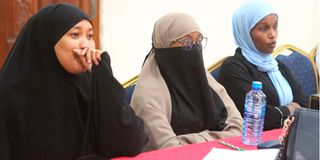'Men switch off radios upon hearing a female voice'; the plight of a Somali female journalist

Some of the female journalists during a sensitisation workshop in Garissa town on June 26, 2024. Most female journalists in the Somali community are victims of harassment.
What you need to know:
- Many female journalists from the Somali community face cultural challenges and workplace disparities.
- Some newsmakers and religious experts prefer male journalists for interviews.
- To avoid further mistreatment, one woman journalist left Mandera for Nairobi, where she feels safer.
When Yasmin Mohamed told her family she was joining college to study journalism, she faced opposition.
"Starting out, I was told journalism is a man's job and I should avoid it. My relatives said it would require me to intermingle with others when I should be pursuing feminine jobs like nursing or education," says the 24-year-old.
Despite this, Yasmin ignored them and proceeded to study, eventually graduating with a diploma in broadcast journalism.
Since then, she has endured cyberstalking, with locals, mostly men, harassing her online.
Fatuma Dekow Maalim, Executive Director of Women Education and Health for Development (WoHed), says female journalists from the Somali community face cultural challenges and workplace disparities.
"Women deal with obstacles their male colleagues don't, including cultural challenges," she says.
She adds, "In our society, some newsmakers and religious experts prefer male journalists for interviews, which disappoints and demoralises female journalists."
Fatuma notes that many female journalists from the community who challenge norms, speak truth to power, or cover controversial topics face heightened backlash for disrupting existing power dynamics and cultural norms.
WoHed's program, "Erase the trace: Unveiling the unseen," aims to equip female journalists through training and moral support.
"Garissa County and the North Eastern region face an emerging challenge. Women in Public and Political Leadership (WIPPL) experience significant technology-facilitated gender-based violence.
"We're trying to bridge the gap by de-normalising toxic narratives to prevent impacts on women's participation in development projects," Fatuma explains.
She attributes harassment of female journalists to ignorance and harmful online narratives aimed at scaring, shaming, threatening, and silencing targets, undermining their right to digital space and information.
Fatuma warns that technology-facilitated gender-based violence can profoundly affect victims' psychological well-being and mental health.
Read also: Have more women lead media
Another journalist, Ramla Abubakar, says she's faced discrimination "multiple times" while gathering reactions on the streets.
"It often happens when collecting vox-pops (informal comments from members of the public) and asking for people's views," she says.
To avoid further mistreatment, she left Mandera for Nairobi, where she feels safer.
"Back home, the community questions why a woman is swinging a microphone or being outside instead of staying home," she says.
Ramla reveals that some families reject girls in media professions.
"Men from our community often badmouth you and spread rumours, making it difficult to even get married," she discloses.
Many men in the community believe their religion prohibits women from becoming journalists.
"We've had situations where men switch off radios upon hearing a female voice. I only do a weekly radio show for women, and it's rare for a man to call and contribute to family topics," says Najma Hussein, another journalist.
To further intimidate female journalists, some men share intimate images without consent or publish private information online, maliciously.
According to WoHed, these normalised behaviours discourage women from participating in public life, reinforcing inequality.
"Victims feel isolated and vulnerable, knowing there's no essential support system or reporting mechanism; this has led to increased stigma," Fatuma concludes.





